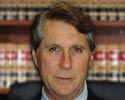Author: J.Michael Hayes
“Personal Injury Attorneys”
A Buffalo Plaintiffs attorney who challenged the New York State Attorney Grievance Committee’s rules related to lawyer advertising has prevailed, ending a legal battle that dates back more than a decade.
Beginning in 1996, J. Michael Hayes attempted to promote his professional Board Certification as a Civil Trial Specialist and Advocate both in advertising and on his firm letterhead. He is Board Certified by the National Board of Legal Specialty Certification, an ABA recognized organization. New York required a 66 word disclaimer be “prominently made” any time such an attorney asserted or advertised that he was a Specialist. Hayes had several “discussions” with the Grievance Committee regarding whether the disclaimer was large enough on bill boards, his letterhead, in the phone book, on tv and on his business cards.
Finally, in 2001 when compromise could not be achieved, Hayes filed a lawsuit challenging the Disciplinary Rule on Specialty advertising on First Amendment Constitutional grounds in Federal Court for the Western District of New York in Buffalo. Three years later upon summary judgment, Judge John Elfvin ruled in favor of the Grievance Committee holding the regulation Constitutional.
Judge Elfvin did determine that there was a question of fact regarding whether the requirement of “prominently made”, particularly as applied to Hayes, was unconstitutionally vague. A Bench trial was held in 2010 before Magistrate H. Kenneth Schroeder, Jr. in which the application of the disclaimer was held not to be “unconstitutionally vague”.
Hayes appealed both decisions, and this week, over ten years after suit was initiated, the Second Circuit Court of Appeals overturned both rulings, sided with Hayes and held that two of the three of the disclaimer assertions were unconstitutional infringements on Free Speech. Furthermore, though they did not rule specifically on the “prominently made” requirement, they held that relative to Hayes only, if the Grievance Committee had any future concerns, they were to contact him FIRST and discuss their concerns, before issuing any grievance letters.
“I think this is great for the legal profession and for the public/consumer” Hayes said of the ruling. “The Court recognized that attorneys who go to court and try cases are likely have greater skills than a general practitioner at that task. With this ruling, Board Certified lawyers can actually tell the public of that recognition. Before, they could not reveal that fact absent the onerous constraint of the disclaimer. This is similar to a Board Certified physician,” he said. “I don’t know anyone who would go to a physician that wasn’t Board Certified, and I think the same could be true for attorneys.”
Was Hayes concerned about challenging the Grievance Committee, a group that wields a tremendous amount of power in New York state? “I wasn’t, and I am not concerned after this ruling. I think they are a professional group that conducts themselves as such,” he said. “This was just a case where I disagreed with the Rules and challenged them.”
Hayes said he is one of only four attorneys in Buffalo that is currently certified. Many others who may be eminently qualified, have either let their certification lapse, or chosen not to take the exam because the rules did not allow them to promote themselves as Specialists. “I know a number of highly-qualified lawyers in Buffalo who have said to me, ‘Why would I want to become certified when I can’t use it? If I give a lecture and someone says that I’m Board Certified, now do I have to give a 66-word disclaimer?’ Attorneys were concerned that they would end up having a grievance filed against them if they got the certification and then disseminated that fact to the public.” Hayes said that he expects this to change in the wake of the latest court decision. Ultimately, it is the consumer who benefits.

